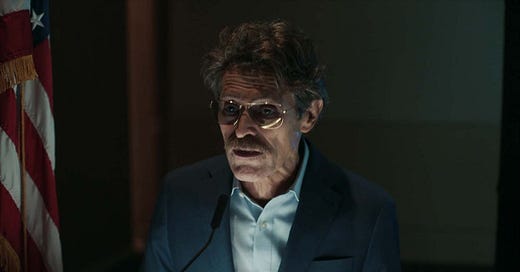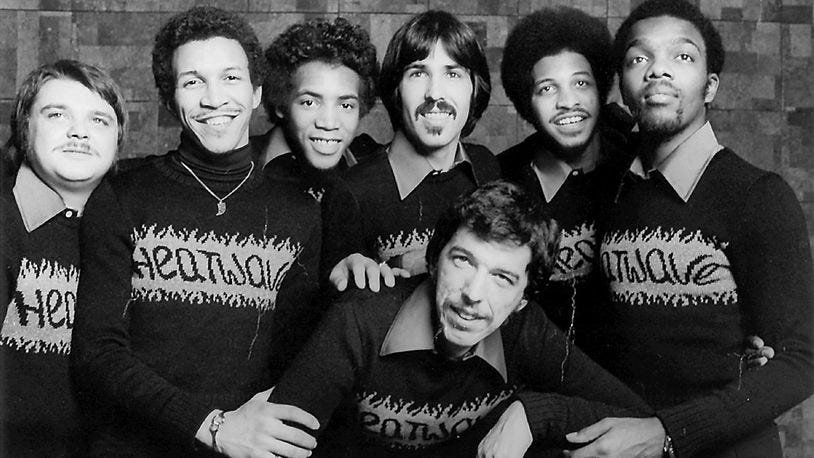Hello! Thank you for signing up to, or stumbling on, this no-news-newsletter written by me, Ashley Clark. If you do choose to subscribe—and it’s free—you’ll receive bulletins about whatever’s on my mind: usually some combination of art/film/music/literature/football. If that sounds good, hit the button!
In a previous newsletter, I wrote about the uncanny joy of organically connecting the dots between the original source of a sample and the track that samples it. And I’ve remembered another such example, which is this week’s quick rec.
Not so long ago, I was listening to A Tribe Called Quest’s peerless 1991 LP “The Low-End Theory”, and was suddenly haunted by the ghostly, two-chord rhythm guitar riff that bobs below of the surface of fifth track “Verses From the Abstract”, which features one of my favorite examples of Q-Tip’s insanely tight but laidback flow. After a minute of furrowed-brow thinking, I managed to mentally trace the riff back to “The Star of a Story”, a gorgeous, oddly tenebrous, string-laden ballad by the soul band Heatwave. It’s from their “Central Heating” (1978), an LP I’d salvaged from a dollar bin a while back.
“Central Heating” is, of course, much more than dollar bin quality, and distinguished by the chops of Lincolnshire-born band member Rod “The Invisible Man” Temperton, the prolific songwriter who went on to write for artists including Michael Jackson, Patti Austin, Chaka Khan, and George Benson (whose own cover of “The Star of a Story” is lovely, but, for my money, a tad effortful compared to the wistful, wispy cling of Heatwave’s version sung by Johnny Wilder.) Enjoy—I think it’s truly one of the greatest songs ever written:
I noticed this week that Paul Schrader’s The Card Counter has been added to HBO Max. This woozy, productively wonky drama, starring Oscar Isaac as a soul-deadened former Guantanamo torturer turned itinerant gambler, was my favorite American studio film of 2021.
Following First Reformed (2017), The Card Counter continues Schrader’s remarkable late career streak of searing, scathing moral dramas about human frailty, existential rot, and systemic failure (or success, depending on your perspective on the US imperial project.) It is also arguably this century’s key film about the way extreme violence is fetishized and embedded within the American psyche and culture—or at least it was until the arrival of Jackass Forever. I’m only half-joking. You’ll know why when you see the genuinely unsettling torture sequence featuring Jackass whipping boy Ehren McGhehey.
I won’t say too much about The Card Counter, which is best encountered as cold as possible; the state it also left me in. But among its myriad grim delights is a supporting turn from Willem Dafoe, who is on especially rancid form as John Gordo, a retired US Major with a dark past and a dark present.
As it happens, Dafoe was the first major star I ever interviewed back in my days as a freelance film journalist. Our chat was pegged to the release of a 2011 thriller called The Hunter, about which I recall little, except that it was perfectly watchable, and also starred—to my great surprise—the actor who played badboy heart-throb Bogdan Drazic in Aussie ‘90s kids TV show Heartbreak High.
(Sidenote: I was doing this interview for the long deceased online publication Grolsch Film Works, where I wrote dozens of reviews, features and listicles over the course of a few years. My commissioning editor was a lovely chap called Oliver Lunn, and I’m still grateful to him for reaching out to me to be one of the site’s first contributors—it was my first truly consistent writing gig. Hilariously, presumably owing to legal requirements related to the publication’s beer sponsorship, you had to enter your date of birth every time you wanted to access the site in order to prove you were of legal age to drink alcohol and consume my white-hot film reviews. This cannot have done wonders for site traffic.)
Anyway, as you can imagine, I was a little nervous before interviewing Dafoe, an actor known for his intensity and facility for playing absolute fucking headcases. I needn’t have worried. He was lovely, and even patiently steered me on the right course when I asked a couple of amateurish questions. (Top tip: actors don’t enjoy being asked things like: “Who’s your favorite director to work with?” or “Was it nice to play a rare lead role because you’re more known as a character actor?”)
Our time was drawing to a close, and I plucked up the courage to ask Dafoe about a rumor I’d heard that he’d been unceremoniously ejected from the set of Michael Cimino’s once derided, since rehabilitated epic Western Heaven’s Gate (1980). For the first time in our talk, he really relaxed back into his seat, and let rip:
It’s true. I’ll tell you exactly what happened. We were sitting in an eight hour long lighting set-up, just the period it was about three months into that production. Executives were flying in all the time. There was lots of tension, we were getting memos, restricting our movements, saying not to speak to the big movie stars. There was all sorts of weird shit going on. People were very tense. It was crazy. One day, Cimino—a perfectionist, a driven man, an artist—is sitting there and he’s having us glorified extras stand, to light. I’m with it, I’m doing it. But eight hours is a long time, so we’re talking to each other occasionally, quietly, which is fine. But this girl next to me tells me a dirty joke and I laugh. I stick out my tongue at her like [makes face]. Cimino hears it, turns around, and I can only say that it wasn’t directed at me, but something else was going on for him, and he felt humiliated; a hallucination. He said, “Willem, step outside.” And that was it. And the really interesting thing is I stepped out, went to my room, and I was like “What happened?” Two hours later I get a knock on my door and some guy that I never even saw hands me a plane ticket and says, “You’re on the plane tomorrow morning.” I said “Wow. Can someone tell me what happened? Did I do something wrong?” And they said, “No. Michael felt that your character had really completed itself, and you’re done shooting!” But here’s the crazy part. I couldn’t leave right then because we were in a remote location, we were in a place with only one place to eat. I called all my friends and I said, embarrassed, “This is one of the first films I’ve ever done. I’m coming back to the theatre. Hallelujah. I’m fired”. It was humiliating. I went to the restaurant and people were so scared by that point that no-one would get near me. I was good with people, but it was only Chris Walken - and I love him to this day, I’ve worked with him since - that came over and said, “That was wrong what happened.” And I went up behind Cimino - he was sitting eating dinner - and I said, “Michael, what happened?” And he ignored me. And I said, “Michael please, what happened?” And some people came and took me away. It was weird.
Interview gold, but poor old Willem. If you want to read more about the miasma of misfortune that was Heaven’s Gate, I strongly recommend the book Final Cut: Art, Money, and Ego in the Making of Heaven's Gate, the Film that Sank United Artists by former UA VP Steven Bach. Like The Card Counter, like having to enter your date of birth to read a film review, and like Dafoe’s anecdote, it is jaw-dropping stuff.
Thank you for reading. Please consider subscribing to this newsletter if you’ve yet to do so, or, if you have, spreading the word. I appreciate it!





